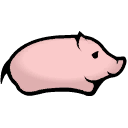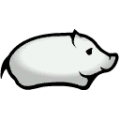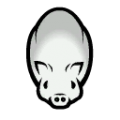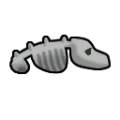Difference between revisions of "Pig"
m (→Analysis) |
Tumbleweed (talk | contribs) m (added combat power to infobox properties) |
||
| (5 intermediate revisions by 2 users not shown) | |||
| Line 12: | Line 12: | ||
|marketvalue = 200 | |marketvalue = 200 | ||
|filth rate = 16 | |filth rate = 16 | ||
| + | |combatPower = 45 | ||
|bodysize = 1.7 | |bodysize = 1.7 | ||
|healthscale = 0.7 | |healthscale = 0.7 | ||
| Line 49: | Line 50: | ||
Pigs are worse for food : grass than a variety of other grazers, from [[cow]]s and [[chicken]]s, to [[horse]]s, [[ibex]], and [[alpaca]]s. Even [[chinchilla]]s are better. The pig's niche is as the most nutritionally efficient ''omnivore'', that does not require taming upkeep. By locking them into a corpse freezer full of dead raiders, this permits the conversion of long pork into pork pork. | Pigs are worse for food : grass than a variety of other grazers, from [[cow]]s and [[chicken]]s, to [[horse]]s, [[ibex]], and [[alpaca]]s. Even [[chinchilla]]s are better. The pig's niche is as the most nutritionally efficient ''omnivore'', that does not require taming upkeep. By locking them into a corpse freezer full of dead raiders, this permits the conversion of long pork into pork pork. | ||
| − | [[Wild boar]]s are the next most efficient omnivore (without training upkeep). | + | [[Wild boar]]s are the next most efficient omnivore (without training upkeep). Boars are worse for nutrition, but are better at surviving cold temperatures (and can be found in the wild). |
=== Nutrition === | === Nutrition === | ||
| Line 55: | Line 56: | ||
An adult pig consumes {{P|Real Hunger Rate}} nutrition per day, and a female creates up to {{#expr: {{P|Average Offspring Per Birth}}/{{P|Gestation Period Days}} round 2}} offspring per day. | An adult pig consumes {{P|Real Hunger Rate}} nutrition per day, and a female creates up to {{#expr: {{P|Average Offspring Per Birth}}/{{P|Gestation Period Days}} round 2}} offspring per day. | ||
| − | * When offspring are slaughtered as babies, a female pig will produce {{#expr:{{Meat Production|{{PAGENAME}}|baby}} round 2}} nutrition of meat per day, giving | + | * When offspring are slaughtered as babies, a female pig will produce {{#expr:{{Meat Production|{{PAGENAME}}|baby}} round 2}} nutrition of meat per day, giving a potential nutrition efficiency of {{%|{{Meat Production|{{PAGENAME}}|baby}}/{{P|Real Hunger Rate}} round 3}} (not counting males). |
| − | * If the offspring are allowed to grow to adulthood, they will consume an additional {{#expr:{{Nutrition Consumption|{{PAGENAME}}|adult}} - {{P|Real Hunger Rate}} round 2}} nutrition per day, but will instead yield {{#expr:{{Meat Production|{{PAGENAME}}|adult}} round 2}} nutrition per day as they are slaughtered, resulting in | + | * If the offspring are allowed to grow to adulthood, they will consume an additional {{#expr:{{Nutrition Consumption|{{PAGENAME}}|adult}} - {{P|Real Hunger Rate}} round 2}} nutrition per day, but will instead yield {{#expr:{{Meat Production|{{PAGENAME}}|adult}} round 2}} nutrition per day as they are slaughtered, resulting in a potential nutrition efficiency of {{%|{{Meat Production|{{PAGENAME}}|adult}}/{{Nutrition Consumption|{{PAGENAME}}|adult}} round 3}}. |
When considering a population of equal numbers of males and females, these nutrition efficiencies fall to {{%|{{Meat Production|{{PAGENAME}}|baby|1|1}}/{{Nutrition Consumption|{{PAGENAME}}|baby|1|1}} round 3}} for baby slaughter and {{%|{{Meat Production|{{PAGENAME}}|adult|1|1}}/{{Nutrition Consumption|{{PAGENAME}}|adult|1|1}} round 3}} for adult slaughter. | When considering a population of equal numbers of males and females, these nutrition efficiencies fall to {{%|{{Meat Production|{{PAGENAME}}|baby|1|1}}/{{Nutrition Consumption|{{PAGENAME}}|baby|1|1}} round 3}} for baby slaughter and {{%|{{Meat Production|{{PAGENAME}}|adult|1|1}}/{{Nutrition Consumption|{{PAGENAME}}|adult|1|1}} round 3}} for adult slaughter. | ||
| − | The next best pen-omnivore, the wild boar, has | + | The next best pen-omnivore, the wild boar, has an potential nutrition efficiency of {{%|{{Meat Production|Wild boar|adult|1|0}}/{{Nutrition Consumption|Wild boar|adult|1|0}} round 3}} (or {{%|{{Meat Production|Wild boar|adult|1|1}}/{{Nutrition Consumption|Wild boar|adult|1|1}} round 3}} nutrient efficient with 1:1 female:male). For comparison, a horse has a base nutrient efficiency of {{%|{{Meat Production|Horse|adult|1|0}}/{{Nutrition Consumption|Horse|adult|1|0}} round 3}}, much higher than a pig or wild boar. Chickens, ibex, and deer reach similar numbers. |
==Training== | ==Training== | ||
| Line 66: | Line 67: | ||
== Health == | == Health == | ||
{{Animal Health Table}} | {{Animal Health Table}} | ||
| + | |||
| + | == Gallery == | ||
| + | <gallery> | ||
| + | Pig east.png|Pig facing east | ||
| + | Pig north.png|Pig facing north | ||
| + | Pig south.png|Pig facing south | ||
| + | Dessicated pig east.png|Pig decaying | ||
| + | </gallery> | ||
== Version history == | == Version history == | ||
Revision as of 23:15, 18 December 2023
Pig
Pigs were one of the first animals domesticated by humans. They are an efficient source of meat, and are easy to feed because they will eat almost anything.
Base Stats
- Type
- Animal
- Flammability
- 70%
Pawn Stats
- Combat Power
- 45
- Move Speed
- 3.9 c/s
- Health Scale
- 0.7
- Body Size
- 1.7
- Mass - Baby
- 20.4 kg
- Mass - Juvenile
- 51 kg
- Mass - Adult
- 102 kg
- Carrying Capacity
- 128 kg
- Filth Rate
- 16
- Hunger Rate
- 0.8 Nutrition/Day
- Diet
- omnivorous grazer
- Life Expectancy
- 12 years
- Manhunter Chance
- 0%
- Manhunter Chance (Taming)
- 0%
- Trainable Intelligence
- None
- Wildness
- 0%
- Roam Interval
- 3 days
- Mate Interval
- 12 hours
- Maturity Age
- 0.333 years (20 days)
- Juvenile Age
- 0.1 years (6 days)
- Comfortable Temp Range
- -5 °C – 40 °C (23 °F – 104 °F)
Production
- Meat Yield
- 238 pork
- Leather Yield
- 68 pigskin
- Gestation Period
- 5.661 days
- Offspring Per Birth
- 1-2 (1.318 avg)
Melee Combat
- Attack 1
- Teeth
7.3 dmg (Bite)
11 % AP
2 second cooldown
0.7 chance factor - Attack 2
- Head
6 dmg (Blunt)
9 % AP
2 second cooldown
0.2 chance factor - Average DPS
- 2.06
- tradeTags
- AnimalFarm, AnimalCommon
Pigs, called sows if female, are a domesticated animal, obtainable from both land and space traders. Pigs are omnivorous, making them easy to feed. They will eat live plants and so should be kept away from the growing zones.
Summary
Pigs are pen animals. Once tamed, pen animals cannot and do not need to be trained any further. But if left outside of a pen or caravan hitching spot, pen animals will eventually roam outside your colony. Making a caravan is not required to tie animals to a caravan hitching spot.
Analysis
Pigs are worse for food : grass than a variety of other grazers, from cows and chickens, to horses, ibex, and alpacas. Even chinchillas are better. The pig's niche is as the most nutritionally efficient omnivore, that does not require taming upkeep. By locking them into a corpse freezer full of dead raiders, this permits the conversion of long pork into pork pork.
Wild boars are the next most efficient omnivore (without training upkeep). Boars are worse for nutrition, but are better at surviving cold temperatures (and can be found in the wild).
Nutrition
When slaughtered, a pig yields 48 meat and 20 leather as a piglet; 119 meat and 36 as a juvenile; or 238 meat and 68 leather as an adult. 1 meat is equal to 0.05 nutrition.
An adult pig consumes 0.8 nutrition per day, and a female creates up to 0.23 offspring per day.
- When offspring are slaughtered as babies, a female pig will produce 0.56 nutrition of meat per day, giving a potential nutrition efficiency of 69.8% (not counting males).
- If the offspring are allowed to grow to adulthood, they will consume an additional 2.4 nutrition per day, but will instead yield 2.77 nutrition per day as they are slaughtered, resulting in a potential nutrition efficiency of 86.5%.
When considering a population of equal numbers of males and females, these nutrition efficiencies fall to 34.9% for baby slaughter and 69.2% for adult slaughter.
The next best pen-omnivore, the wild boar, has an potential nutrition efficiency of 71.1% (or 56.5% nutrient efficient with 1:1 female:male). For comparison, a horse has a base nutrient efficiency of 150.6%, much higher than a pig or wild boar. Chickens, ibex, and deer reach similar numbers.
Training
This animal can be trained as follows:
| Guard: | |
|---|---|
| Attack: | |
| Rescue: | |
| Haul: | |
*As of version 1.1.2610, all animals can be tamed. The percentage of likelihood of success depends on factors such as the Animals Wildness Percentage, Pawn Handling Skill, and others. More information can be found on the animals page.
Health
Gallery
Version history
- 0.12.906 - Added
- 1.3.3066 - Trainability changed from advanced to none, pigs now are predominantly a pen animal.




